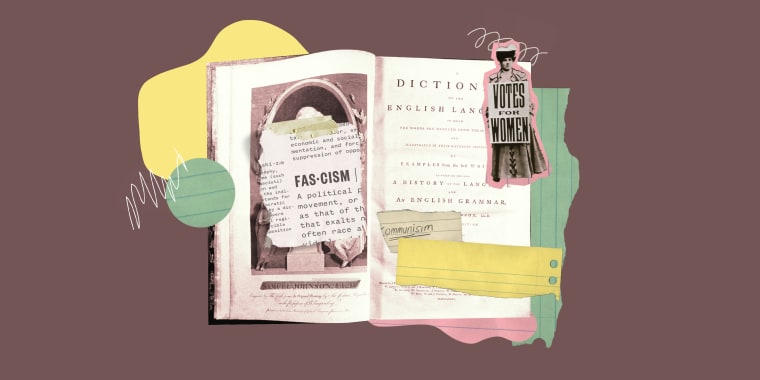With the 2020 presidential election just weeks away, it can feel like all of your social media connections suddenly think they're political analysts. These days, you'll often see terms like "fascism" and "socialism" thrown around, but are people actually using them correctly?
The answer is only sometimes, as many of the political phrases du jour have important historical contexts or specific definitions that can get lost in the rabble-rousing of Twitter and Facebook.
"You call someone a fascist or antifa, those are meant to convey bad things," Mark Rom, Ph.D, a professor at Georgetown University's McCourt School of Public Policy, told TMRW. "You're saying someone has adopted a foreign ideology that will destroy the United States. ... Typically these are just insults without meaning."
On both sides of the political spectrum, people make these errors, Rom said. So here's what to know the next time you use any of these trending terms.
Fascism
Rom stressed that fascism as a political ideology has several "core concepts." It "favors the nation above all ... my community above all, masculinity and militarism, protection of homeland against foreign threats, suspicion of foreigners ... There is a 'true American' or nationalist of any country that would be fascist," he said.
The idea of "America first" itself isn't fascist, but it's "consistent with that line of thinking," Rom clarified. Addressing those who call the president fascist, he said, "Scholars have made the argument that President Trump has fascist tendencies, but not that he is a fascist."
Historically, fascism is associated with Italian dictator Benito Mussolini, who was in office from 1922 to 1943, so it doesn't usually elicit images of modern-day politics, Victoria de Grazia, Ph.D, history professor at Columbia University, told TMRW.
"We are 60, 70, 80 years from the original period of fascism, and we’re seeing reactionary, right-wing, populist movements and regimes emerging all over the world," she said. "If we use the term 'fascism,' we misread what’s specific about those today. ... It plays on a kind of paranoia, which doesn’t take stock of the real dangers."
Socialism
"Socialism" was referenced often at the Republican National Convention, but Patrick Egan, professor of politics and public policy at New York University, said it's the term he hears used the "most inaccurately."
"(Socialism is) much farther to the left than what Democrats are proposing to do," he told TMRW. "Typically when we think about socialism, a big aspect ... is a fair amount of state ownership of the economy. Socialist governments might nationalize different industries, like transportation or energy ... and the Biden campaign is proposing no such thing."
The term has also been embraced by those on the left, Rom said. "There's a minority of the U.S. population that says, 'We're socialist, and we're proud of it. Biden is not, we wish he were.'"
Some people who use the term negatively imbue it with a racial undertone, added Rashad Robinson, president of civil rights advocacy group Color of Change.
"People like things that are run by government in some ways, like social security and other anti-poverty programs," he told TMRW. "When the country becomes more diverse, ensuring people have the things they need to survive is now classified as socialism, and as a result socialism is seen as something that isn't in line with a functioning democracy."
Liberal
Today, the word liberal describes people on the left of the political spectrum, and it's come to have negative connotations for both sides of the aisle, Rom said.
"The classic, British use of the word 'liberal' is ... faith in reason, faith in individual autonomy, strong government but also strong civil society and a separation between the two," he explained. "That's not how American liberals are understood. They're seen as favoring bigger government, more regulation, higher taxes. In my view, liberalism is one of those terms ... the Democrats have kind of given up on."
"We call it 'progressive' today — it would've been called 'liberal' 30 years ago," he continued. "But the Republicans were so successful in demonizing liberalism that it's relatively rare for people to say, 'I'm a liberal.'"
Egan added that liberals "tend to favor more government regulation of the economy but less regulation of individuals' choices." Conservatives, meanwhile, "are the opposite," he said.
Women's vote
You've likely heard that women will play a crucial role in this election, justified with some data about "the women's vote." But much of the time, media coverage isn't telling the full story that polling women can highlight, according to Debbie Walsh, director of the Center for American Women and Politics.
"There are two concepts: the gender gap and the women's vote," Walsh told TMRW. "The women's vote is the percentage-point advantage that one candidate has over the other among women voters. ... The gender gap is measuring the difference in the way men and women are voting."
The gender gap in voting is the difference between the percentage of men and percentage of women voting for a particular candidate, but oftentimes, reports ignore this data point and refer to "the women's vote" as "the gender gap," Walsh said. "People say, 'Women will be important in this election,' but if you only look at the women's vote, you're missing a big piece."
While "the women's vote" and "the gender gap" in polling have straightforward definitions, many other political terms are open to some degree of interpretation — so you may feel friends are using a term incorrectly and they don't.
But that's not necessarily bad, de Grazia said. "It's OK not only to disagree but to try to go as far as you can to understand ... whomever (you) regard as the other."

